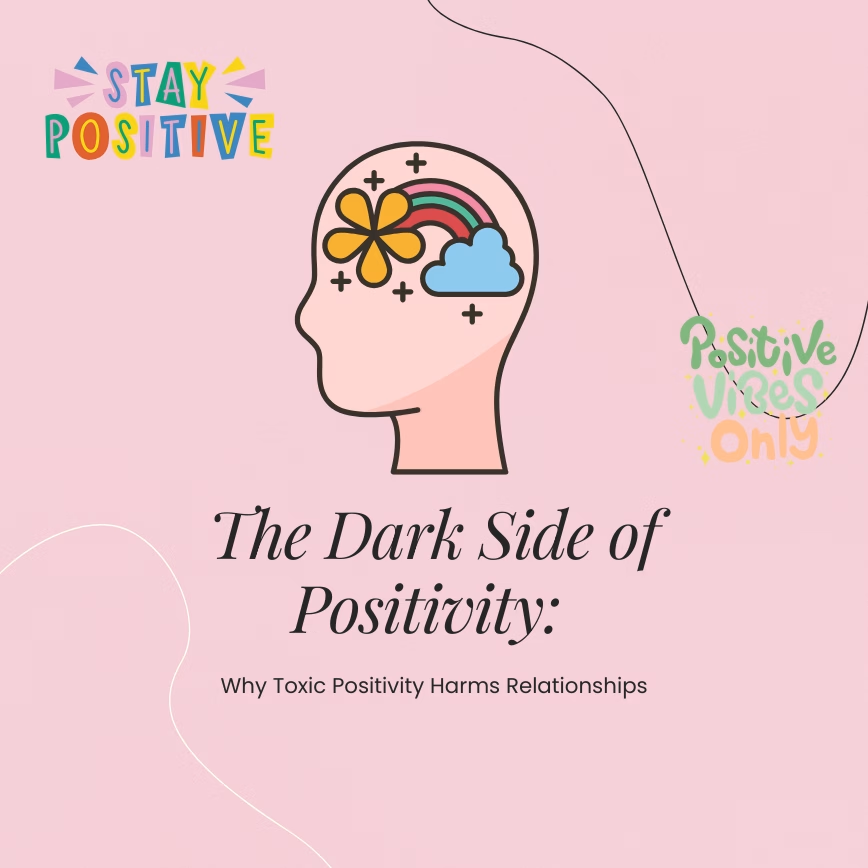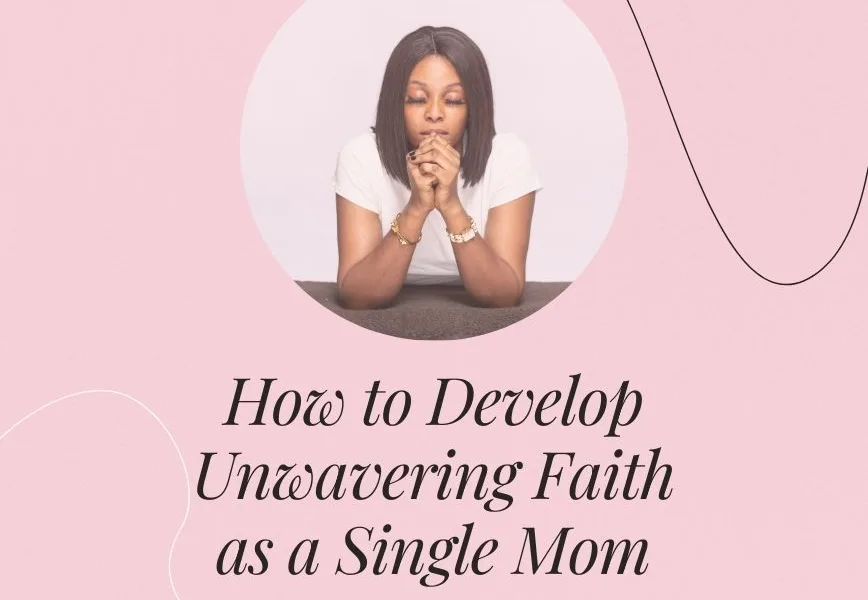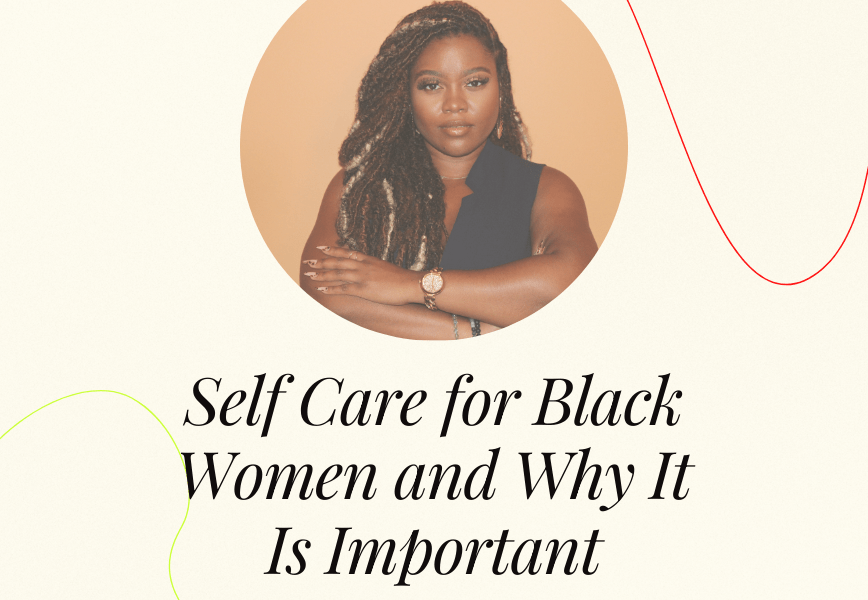
Toxic positivity may seem like a conundrum, especially in a world that constantly glorifies the fabulous moments in life and encourages us to always “look on the bright side,” it’s easy to believe that positivity is always the answer. But what happens when positivity becomes toxic? When we are expected to suppress our genuine emotions for the sake of maintaining a “good vibe,” we aren’t actually healing—we’re harming ourselves and our relationships.
Recently, I experienced a situation where someone dismissed my genuine emotions, making me feel invalidated and even gaslighted. Instead of offering support, they implied that I was being too negative, as if acknowledging my feelings was a personal flaw. This is toxic positivity in action, and it can seriously damage friendships, romantic relationships, and even our self-worth.
What Is Toxic Positivity?
Toxic positivity is the belief that no matter how difficult or painful a situation is, people should maintain a positive mindset and suppress negative emotions. It manifests in phrases like:
- “I am optimistic, I don’t consider negative thoughts.”
- “Be more positive.”
- “It could be worse.”
- “Other people have it harder than you.”
- “Everything happens for a reason.”
- “You’ll get over it soon.”
While optimism is valuable, forced positivity ignores the complexity of human emotions. It tells people that their struggles aren’t valid and that feeling anything other than happiness is wrong.
Another subtle but harmful aspect of toxic positivity is labeling someone as pessimistic or negative just because they express a difficult emotion. If you’ve ever been told, “You’re being so negative” when you were simply being honest about a tough situation, you’ve experienced this firsthand. It creates shame around having natural emotions and pressures people into pretending everything is fine when it’s not.
Why Toxic Positivity Hurts Relationships
When someone dismisses your emotions with toxic positivity, it can feel like they are saying, “I don’t want to deal with your feelings.” This can create emotional distance, break trust, and prevent deeper connections. Here’s how it negatively impacts relationships:
1. it Invalidates Real Feelings
Feeling sad, angry, or frustrated is part of the human experience. When a friend or partner responds to your struggles with toxic positivity, it sends the message that your emotions are inconvenient or unimportant.
2. It Creates Emotional Isolation
You might withdraw from relationships if you feel like you can’t be honest about your struggles. No one wants to open up if they fear being met with dismissiveness instead of understanding.
3. It Discourages Vulnerability
True intimacy comes from sharing both the highs and lows of life. When toxic positivity is present, people feel pressured to hide their struggles, making relationships feel shallow and performative.
4. It Causes Self-Doubt
When someone constantly tells you to “just be happy” or labels you as “too negative,” you may question whether your emotions are justified. This can lead to self-gaslighting—convincing yourself that your feelings don’t matter when they absolutely do.
How to Combat Toxic Positivity
If you’ve ever been on the receiving end of toxic positivity, you know how frustrating it can be. Here’s how to handle it and encourage healthier emotional responses in your relationships:
1. Acknowledge and Validate Feelings
Instead of dismissing emotions, practice validating them. Try saying:
- “That sounds really tough. I’m here for you.”
- “It makes sense that you feel that way.”
- “I appreciate you sharing this with me.”
- “I know you’re feeling this way but I want to help ease your mind.”
2. Encourage Honest Conversations
If someone shuts down your emotions with toxic positivity, express how their words make you feel. You can say, “I appreciate your words, but right now, I just need someone to listen.”
3. Be Mindful of Your Own Responses
If you catch yourself offering toxic positivity, pause and reframe your response. Instead of saying, “I’m optimistic, I don’t think like that,” try, “That sounds really painful. How can I support you?”
4. Surround Yourself with Emotionally Supportive People
If you’re constantly met with toxic positivity, it may be time to evaluate your circle. Healthy relationships allow space for all emotions—not just the positive ones.
Final Thoughts
Toxic positivity often comes from a place of good intentions, but it can do more harm than good. True self-care isn’t about ignoring negative emotions but embracing them, processing them, and allowing yourself to heal. By fostering emotionally supportive relationships, we create spaces where we can be our authentic selves, free from judgment or suppression.
Your feelings are valid. Your experiences matter. And you deserve relationships that honor the full spectrum of who you are.





https://t.me/official_1win_aviator/262
https://t.me/official_1win_aviator/92
https://t.me/Best_promocode_rus/1291
https://t.me/s/ef_beef
Thanks for sharing. I read many of your blog posts, cool, your blog is very good. https://accounts.binance.info/bn/register?ref=WTOZ531Y
Nếu bạn đang tìm kiếm một sân chơi giải trí trực tuyến ổn định, hiện đại và đa dạng trò chơi, slot365 net chính là lựa chọn đáng để trải nghiệm. Với hệ thống trò chơi phong phú như: Bắn Cá Đổi Thưởng, Mini Game Đá Gà, Xổ Số Ba Miền, Thể Thao Điện Tử,… Tại đây mang đến không gian giải trí sống động, phù hợp với nhiều đối tượng người dùng.
https://t.me/officials_pokerdom/3430
slot365 casino Sau khi cài đặt ứng dụng, mở ứng dụng và chọn “Đăng ký”. Bạn nên đủ các thông tin yêu cầu bao gồm tên đăng nhập, mật khẩu, địa chỉ email và số điện thoại khi bạn thực hiện đăng ký tài khoản mới. Thông tin chính xác thì quá trình xác minh tài khoản diễn ra thuận lợi.
Your article helped me a lot, is there any more related content? Thanks!
https://t.me/s/Martin_casino_officials
Can you be more specific about the content of your article? After reading it, I still have some doubts. Hope you can help me.
Hãy cùng chúng tôi khám phá 5+ yếu tố làm nên thương hiệu cá cược trực tuyến hàng đầu thị trường 888SLOT . TONY12-16
Einsatzlimits, Auszahlungsregeln und Bonusbedingungen sind im
Hilfebereich jederzeit einsehbar, und mit Funktionen wie Einzahlungslimits, Reality
Checks, Selbstsperren und Pausenoptionen lässt sich das eigene Spielverhalten aktiv steuern. Diese Online-Casinos
bieten mehr als 1500 Spiele zu verschiedenen Themen an. Bewertung
8,4Willkommensbonus hier 100% bis zu 350 €. Sie können Magie gegen Freispiele und Boni eintauschen.
Bewertung 8,5Dieses Kasino genießt einen Willkommensbonus von 100%
bis zu 100 €.
Ja, es gibt Glücksspiele in allen gängigen Formaten. Es bietet Dienstleistungen unter einer Lizenz von Curacao an. Freispiele für Video-Slots werden an Neu- und Stammkunden vergeben.
Nein, für die Registrierung bei RocketPlay werden keine Einzahlungsboni
angeboten. Zum Beispiel können sie Spiele in Demo-Versionen ausprobieren, Freespins erhalten und an verschiedenen Aktionen teilnehmen. Die
Mindesteinzahlung beträgt umgerechnet zwanzig Dollar.
References:
https://online-spielhallen.de/druckgluck-casino-bewertung-meine-ausfuhrliche-analyse/
Der Betreiber Fat Pirate präsentiert eine lebendige Auswahl an Spielautomaten von führenden Entwicklern, von denen jedes einzigartige Themen, Funktionen und
more bietet. Fat Pirate bietet ein umfassendes und spannendes Casino-Erlebnis mit einer großen Selection von Spielen von Top-Anbietern, die unterschiedlichen Vorlieben gerecht werden. Mit einer Lizenz aus Curacao bietet sie eine vertrauenswürdige Umgebung für
das Gaming.
Freuen Sie sich auf lohnende Einzahlungsboni, exklusive Cashback-Angebote
sowie den Nervenkitzel durch Freispiele und spezielle Promotionen. Neue
Spieler erhalten Zugang zu Tutorials, Demorunden und
einem lohnenden Willkommensbonus. Genießen Sie eine riesige Auswahl an beliebten Tischspielen und
einzigartigen Spielvarianten mit sofortigen Einzahlungen und Auszahlungen. Erhalten Sie
einen 100% Bonus auf Ihre erste Einzahlung bis zu 500 € und genießen Sie zusätzliche Freispiele für einen erfolgreichen Start bei Brand
Casino!
Jeder Slot läuft reibungslos auf Mobil- und Desktop-Geräten und gewährleistet Spitzenleistung, wo immer
Sie spielen. Es gibt Jackpot-Spiele, Video-Slots mit Freispielen, Bonusrunden,
Multiplikatoren und Optionen mit hoher Volatilität.
Sie können Spielautomaten, Tischspiele, Live-Dealer-Titel und
Sofortspiele spielen. Bei Fat Pirate Online spielen Sie nicht nur —, Sie legen Ihren eigenen Kurs fest, um Schätze zu sammeln.
Sie können auf Ihrem Computer oder Mobiltelefon spielen. Sie können auf dem Desktop oder Mobilgerät spielen, mit
oder ohne App, und intelligente Tools für verantwortungsvolles Glücksspiel verwenden.
References:
https://online-spielhallen.de/avantgarde-casino-freispiele-ihr-weg-zu-kostenlosem-spielspas/
Your article helped me a lot, is there any more related content? Thanks! https://accounts.binance.com/en/register-person?ref=JHQQKNKN
With over 2,600 gaming machines and countless table games, it’s the largest casino in the Southern Hemisphere.
I love that beyond the gaming, the venue offers luxury hotel rooms, fine dining, and even a theatre, so it’s not just about gambling but a full entertainment experience.
In Australia, these land-based casinos are fully legal and licensed by state authorities,
so you can trust that the games are fair and the venues follow
responsible gambling rules.
Furthermore, at online.casino, you will find tons
of honest casino reviews for Australian high-quality casinos.
The Australian online casino scene is among the best in the
world. Not for recreational players, since gambling winnings aren’t classed as income.
You collect these by depositing and wagering,
and you get extra perks or bonuses in return. If you’re playing blackjack,
for example, the cards will be dealt right in front of you as
if you were at a real casino, with the dealer standing
on the opposite side of the table. The three things these games have in common are that their RTP is very high (usually 98%+), the gameplay is quick, and they all offer
a different type of gameplay. This adds yet another element
to playing casino games, and I’m all in for this one.
This really feels like you’re not just gambling – but you’re playing a game and completing missions that get harder
and harder as you progress, while the rewards get bigger and bigger.
References:
https://blackcoin.co/44_diamond-vip-casino-review_rewrite_1/
Let’s get the ball rolling, and don’t forget to
grab your first bonuses! They know how to put together a cracking game, with solid payouts and reliable gameplay.
A household name in the casino world, Microgaming has been making waves
for years. Expect loads of thrills with games that stand out.
With big rewards, high stakes, and timeless elegance, this
one’s for the big players. Whether you’re a card-counting shark or just want to have a crack at some strategic play,
this one’s always a choice.
Yes, Sky Crown operates legally under a Curacao eGaming license and welcomes Australian players
aged 18 and over. Just instant access to the full gaming library through your mobile browser,
optimized for Australian internet speeds and touchscreen controls.
Whether you’re chasing progressive jackpots, exploring
immersive live dealer tables, or spinning classic pokies, you’ll discover entertainment options that match your mood and budget.
Set deposit limits, cooling-off periods, and self-exclusion options directly from your account dashboard.
Sky Crown demonstrates its commitment to responsible gambling by
providing comprehensive player protection tools.
Just pure, provably fair gaming that gives every Australian player an equal shot at winning.
References:
https://blackcoin.co/best-live-casinos-in-australia-2025-guide/
This casino pretends to be part of a famous brand, but it’s clearly not.
They mimic the real casino’s look, then swap
the real link with a mirror that points to a shady operator.
The site pretends to be a trusted brand, even copies their bonus offers and
design. If you are searching for a new and exciting gaming experience that is specifically designed for Australians,
you should give SkyCrown a try. To get the bonus, you need to put at least A$20
in your account for your first purchase.
This multi-tiered approach allows players to maximize benefits
while exploring various game categories without
feeling rushed to utilize their bonus funds immediately. Whether you
enjoy the thrill of online pokies, live dealer games, or placing bets on sports, SkyCrown Casino has everything
you need to make the most of your online gaming journey.
With a wide variety of payment options, including credit cards, e-wallets, and cryptocurrencies, players
can easily deposit and withdraw funds. The loyalty program and VIP rewards ensure that
frequent players receive personalized attention, exclusive offers, and additional perks.
References:
https://blackcoin.co/casumo-casino-review-rewards-slots-and-payments-how-is-customer-service/
Cheque your credentials twice before contacting customer support for assistance if needed.
New members who aim to join King Johnnie Casino require
information about the account setup procedure. Join now and
discover why King Johnnie is the ultimate destination for
gamers worldwide. Cryptocurrencies like Bitcoin, Ethereum,
and USDT have a minimum deposit of AUD 20
with variable processing times. For deposits, Visa and MasterCard
are available with no fees, while Skrill and Neteller also offer instant processing.
Claim a generous sign up bonus on your first 10 deposits with us plus a whopping 200 free spins.
The platform also uses advanced encryption protocols to protect players’ personal and financial data from unauthorized access.
King Johnnie places a strong emphasis on fairness and security to provide
a trustworthy gaming environment for its players. The
casino also places a priority on security, employing encryption technologies
to protect players’ financial information. These incentives help augment gameplay and increase the chances of players winning big.
Players can also take advantage of weekly promotions, cashback offers, and loyalty
rewards through the casino’s VIP program.
These regulators are known for their strict
standards, ensuring fair play, secure transactions,
and strong player protection. At King Johnnie Casino,
real money gaming is not only exciting but also safe, seamless,
and rewarding. King Johnnie Casino tries to provide you with as many alternatives as possible to make depositing and withdrawing as simple as
feasible. You can start depositing as low as AUD 10 and a maximum deposit of AUD 2,500.
King Johnnie Casino makes depositing and withdrawing funds with them both easy and safe.
Online video poker combines both strategy and excitement in one game, where
you have the opportunity to test your poker
skills.
References:
https://blackcoin.co/canasta-poker-rules-and-variations/
paypal casinos online that accept
References:
https://cannabisjobs.solutions/
paypal casino canada
References:
https://www.to-hub.shop/bbs/board.php?bo_table=free&wr_id=228
gamble online with paypal
References:
http://excelrenforcement.com/companies/paypal-casinos-2025-best-online-casinos-accepting-paypal/
online poker real money paypal
References:
https://lovelocals.us/russellcroft20
paypal casinos for usa players
References:
https://bhakticonsultaants.com/employer/best-payout-online-casinos-2025-highest-paying-online-casinos/
online pokies australia paypal
References:
https://skillproper.com/employer/best-online-casinos-australia-top-aussie-real-money-sites-2025/
Your article helped me a lot, is there any more related content? Thanks!
888slot free to join tự tin mang đến những chương trình khuyến mãi độc quyền, có giá trị thực tế cao nhất thị trường hiện nay. Đăng ký ngay hôm nay để nhận gói chào mừng lên đến 150.000 VNĐ tiền cược trải nghiệm và cơ hội nhân đôi số vốn trong lần nạp đầu tiên. TONY01-04H
Được bảo trợ pháp lý bởi CEZA, 888slot khẳng định vị thế của một nhà cái quốc tế chuyên nghiệp. Đây là điểm đến lý tưởng cho những nhà đầu tư tìm kiếm sự ổn định và minh bạch. TONY01-06S
Slot tại 888SLOT có nhiều cấp độ jackpot: Mini (từ 1 triệu), Minor (10 triệu), Major (100 triệu), Grand (1 tỷ+) – phù hợp với mọi mức cược và giấc mơ đổi đời. TONY01-16
I was suggested this blog by my cousin. I’m not sure whether this post is written by him as nobody else know such detailed about my problem.
You’re amazing! Thanks!
Hey there! I could have sworn I’ve been to this website before but after checking through some of the post I realized it’s new to me. Anyhow, I’m definitely happy I found it and I’ll be book-marking and checking back frequently!
Good day! I could have sworn I’ve been to this website before but after reading through some of the post I realized it’s new to me. Nonetheless, I’m definitely delighted I found it and I’ll be book-marking and checking back frequently!
Hi! I could have sworn I’ve been to this site before but after browsing through some of the post I realized it’s new to me. Nonetheless, I’m definitely delighted I found it and I’ll be bookmarking and checking back often!
Hey! I could have sworn I’ve been to this site before but after browsing through some of the post I realized it’s new to me. Anyways, I’m definitely delighted I found it and I’ll be book-marking and checking back often!
Howdy! I could have sworn I’ve been to this blog before but after browsing through some of the post I realized it’s new to me. Anyways, I’m definitely delighted I found it and I’ll be bookmarking and checking back often!
Hi! I could have sworn I’ve been to this blog before but after checking through some of the post I realized it’s new to me. Nonetheless, I’m definitely delighted I found it and I’ll be book-marking and checking back frequently!
Have you ever considered publishing an e-book or guest authoring on other blogs? I have a blog centered on the same ideas you discuss and would really like to have you share some stories/information. I know my audience would enjoy your work. If you are even remotely interested, feel free to send me an email.
Hello! I just wanted to ask if you ever have any issues with hackers? My last blog (wordpress) was hacked and I ended up losing a few months of hard work due to no backup. Do you have any solutions to stop hackers?
Greetings from Ohio! I’m bored to death at work so I decided to check out your website on my iphone during lunch break. I really like the knowledge you provide here and can’t wait to take a look when I get home. I’m shocked at how quick your blog loaded on my cell phone .. I’m not even using WIFI, just 3G .. Anyhow, excellent site!
I am genuinely pleased to glance at this web site posts which consists of tons of useful information, thanks for providing such data.
My coder is trying to persuade me to move to .net from PHP. I have always disliked the idea because of the costs. But he’s tryiong none the less. I’ve been using WordPress on various websites for about a year and am concerned about switching to another platform. I have heard fantastic things about blogengine.net. Is there a way I can transfer all my wordpress posts into it? Any kind of help would be really appreciated!
Hi there! I just wanted to ask if you ever have any trouble with hackers? My last blog (wordpress) was hacked and I ended up losing a few months of hard work due to no back up. Do you have any methods to protect against hackers?
I got this web page from my pal who shared with me on the topic of this web site and at the moment this time I am visiting this site and reading very informative articles here.
Highly descriptive article, I loved that a lot. Will there be a part 2?
Excellent beat ! I would like to apprentice while you amend your web site, how could i subscribe for a blog web site? The account aided me a acceptable deal. I had been tiny bit acquainted of this your broadcast provided bright clear idea
When I originally commented I clicked the “Notify me when new comments are added” checkbox and now each time a comment is added I get three emails with the same comment. Is there any way you can remove me from that service? Thank you!
Write more, thats all I have to say. Literally, it seems as though you relied on the video to make your point. You obviously know what youre talking about, why throw away your intelligence on just posting videos to your site when you could be giving us something enlightening to read?
I know this web site presents quality depending articles and additional information, is there any other web page which gives such things in quality?
I’ve been browsing online more than 3 hours today, yet I never found any interesting article like yours. It’s pretty worth enough for me. In my view, if all site owners and bloggers made good content as you did, the web will be a lot more useful than ever before.
Excellent post but I was wondering if you could write a litte more on this subject? I’d be very grateful if you could elaborate a little bit more. Appreciate it!
We stumbled over here from a different web page and thought I might as well check things out. I like what I see so now i’m following you. Look forward to looking at your web page yet again.
Pretty! This has been an incredibly wonderful post. Thank you for providing this info.
I do accept as true with all the ideas you’ve offered on your post. They are very convincing and can certainly work. Still, the posts are very quick for beginners. May just you please prolong them a little from next time? Thank you for the post.
Definitely believe that which you stated. Your favorite reason appeared to be on the net the easiest thing to be aware of. I say to you, I definitely get irked while people consider worries that they plainly don’t know about. You managed to hit the nail upon the top as well as defined out the whole thing without having side effect , people could take a signal. Will probably be back to get more. Thanks
Fine way of telling, and good post to take facts about my presentation subject matter, which i am going to convey in university.
Your point of view caught my eye and was very interesting. Thanks. I have a question for you.
Hi it’s me, I am also visiting this website daily, this web site is truly pleasant and the visitors are in fact sharing nice thoughts.
Hello I am so thrilled I found your website, I really found you by mistake, while I was browsing on Yahoo for something else, Regardless I am here now and would just like to say thanks a lot for a fantastic post and a all round exciting blog (I also love the theme/design), I don’t have time to read through it all at the moment but I have bookmarked it and also included your RSS feeds, so when I have time I will be back to read a great deal more, Please do keep up the superb work.
Howdy! I could have sworn I’ve visited this web site before but after going through many of the posts I realized it’s new to me. Anyways, I’m definitely happy I stumbled upon it and I’ll be book-marking it and checking back regularly!
Hi there, I enjoy reading through your post. I wanted to write a little comment to support you.
Hello everyone, it’s my first visit at this website, and paragraph is truly fruitful in favor of me, keep up posting these types of articles or reviews.
I was suggested this website through my cousin. I’m not certain whether this submit is written by him as nobody else recognize such designated about my difficulty. You are wonderful! Thank you!
I all the time emailed this website post page to all my friends, because if like to read it then my friends will too.
Hi there very nice web site!! Man .. Excellent .. Amazing .. I’ll bookmark your web site and take the feeds additionally? I am happy to find a lot of helpful information right here within the publish, we’d like develop more techniques in this regard, thanks for sharing. . . . . .
Hi would you mind sharing which blog platform you’re using? I’m looking to start my own blog soon but I’m having a hard time deciding between BlogEngine/Wordpress/B2evolution and Drupal. The reason I ask is because your design and style seems different then most blogs and I’m looking for something completely unique. P.S Sorry for being off-topic but I had to ask!
Hey there! I’ve been following your site for some time now and finally got the bravery to go ahead and give you a shout out from Huffman Tx! Just wanted to say keep up the good work!
Hi to every one, the contents existing at this web page are truly amazing for people experience, well, keep up the nice work fellows.
I really like reading through an article that will make men and women think. Also, thank you for permitting me to comment!
We’re a group of volunteers and opening a new scheme in our community. Your website provided us with valuable info to work on. You’ve done an impressive job and our whole community will be thankful to you.
Great blog here! Also your website loads up very fast! What web host are you using? Can I get your affiliate link to your host? I wish my site loaded up as quickly as yours lol
Hey! I realize this is sort of off-topic however I needed to ask. Does running a well-established website like yours take a large amount of work? I am brand new to writing a blog however I do write in my journal daily. I’d like to start a blog so I will be able to share my experience and views online. Please let me know if you have any kind of ideas or tips for new aspiring blog owners. Appreciate it!
Hello there, You’ve done a fantastic job. I will certainly digg it and for my part recommend to my friends. I’m confident they’ll be benefited from this web site.
This is a really good tip especially to those new to the blogosphere. Simple but very precise information… Thank you for sharing this one. A must read post!
Heya i’m for the first time here. I came across this board and I in finding It really useful & it helped me out a lot. I am hoping to offer something again and aid others such as you helped me.
I have read so many posts about the blogger lovers except this piece of writing is in fact a fastidious post, keep it up.
Hello! This is kind of off topic but I need some guidance from an established blog. Is it very hard to set up your own blog? I’m not very techincal but I can figure things out pretty quick. I’m thinking about making my own but I’m not sure where to begin. Do you have any tips or suggestions? Thanks
When I originally commented I clicked the “Notify me when new comments are added” checkbox and now each time a comment is added I get several e-mails with the same comment. Is there any way you can remove people from that service? Thanks!
An impressive share! I have just forwarded this onto a colleague who had been conducting a little research on this. And he in fact ordered me dinner because I found it for him… lol. So let me reword this…. Thank YOU for the meal!! But yeah, thanx for spending the time to talk about this matter here on your internet site.
You really make it appear so easy along with your presentation but I to find this topic to be actually something that I think I’d by no means understand. It kind of feels too complex and extremely wide for me. I am taking a look ahead for your subsequent post, I’ll try to get the hang of it!
whoah this weblog is fantastic i really like studying your articles. Keep up the good work! You realize, lots of people are hunting around for this info, you can help them greatly.
Good day! Do you know if they make any plugins to assist with Search Engine Optimization? I’m trying to get my blog to rank for some targeted keywords but I’m not seeing very good gains. If you know of any please share. Kudos!
Have you ever thought about creating an ebook or guest authoring on other blogs? I have a blog based on the same topics you discuss and would really like to have you share some stories/information. I know my audience would value your work. If you are even remotely interested, feel free to shoot me an e-mail.
Pretty! This has been a really wonderful article. Thank you for providing this info.
Awesome article.
What’s up, I wish for to subscribe for this webpage
to take newest updates, thus where can i do it please assist.
Everything is very open with a precise description of
the challenges. It was truly informative. Your site is useful.
Many thanks for sharing!
Do you have a spam issue on this blog; I also am a blogger, and I was wondering your situation; many
of us have developed some nice methods and we are looking
to swap solutions with others, be sure to shoot me an email if interested.
Today, while I was at work, my cousin stole my iphone and tested to see if it
can survive a 40 foot drop, just so she can be a youtube sensation.
My apple ipad is now destroyed and she has 83 views. I know
this is totally off topic but I had to share it with someone!
Hi there! Would you mind if I share your blog with my facebook group? There’s a lot of folks that I think would really enjoy your content. Please let me know. Many thanks
I really like what you guys are usually up too. This kind of clever work and exposure! Keep up the superb works guys I’ve you guys to my personal blogroll.
Thanks to my father who informed me about this web site, this web site is in fact amazing.
Thank you for your sharing. I am worried that I lack creative ideas. It is your article that makes me full of hope. Thank you. But, I have a question, can you help me? https://accounts.binance.com/cs/register-person?ref=OMM3XK51